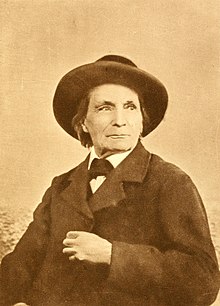Jean-Henri Fabre
| Jean-Henri Fabre | |
|---|---|
 |
|
| Born |
December 22, 1823 Saint-Léons, Aveyron, France |
| Died | October 11, 1915 (aged 91) Sérignan-du-Comtat, Vaucluse, France |
| Nationality | French |
| Fields | Entomology |
| Known for | Popular books on insects |
Jean-Henri Casimir Fabre (December 22, 1823 – October 11, 1915) was a French naturalist, entomologist, and author known for the lively style of his popular books on the lives of insects.
Fabre was born on December 22, 1823 in Saint-Léons in Aveyron, France. Fabre was largely an autodidact, owing to the poverty of his family. Nevertheless, he acquired a primary teaching certificate at the young age of 19 and began teaching in Carpentras whilst pursuing further studies. In 1849 he was appointed to a teaching post in Ajaccio (Corsica), then in 1853 moved on to the lycée in Avignon.
Fabre was a popular teacher, physicist, chemist and botanist. However, he is probably best known for his findings in the field of entomology, the study of insects, and is considered by many to be the father of modern entomology. Much of his enduring popularity is due to his marvelous teaching ability and his manner of writing about the lives of insects in biographical form, which he preferred to a clinically detached, journalistic mode of recording. In doing so he combined what he called "my passion for scientific truth" with keen observations and an engaging, colloquial style of writing. Fabre wrote:
Others again have reproached me with my style, which has not the solemnity, nay, better, the dryness of the schools. They fear lest a page that is read without fatigue should not always be the expression of the truth. Were I to take their word for it, we are profound only on condition of being obscure.
His Souvenirs Entomologiques is a series of texts on insects and arachnids. He influenced the later writings of Charles Darwin, who called Fabre "an inimitable observer". Fabre, however, was a Christian who remained sceptical about Darwin's theory of evolution, as he always held back from all theories and systems. His special force was exact and detailed observation, field research, always avoiding general conclusions from his observations, which he considered premature.
In one of Fabre's most famous experiments, he arranged Pine Processionary caterpillars to form a continuous loop around the edge of a pot. As each caterpillar instinctively followed the silken trail of the caterpillars in front of it, the group moved around in a circle for seven days.
...
Wikipedia
